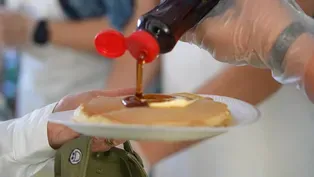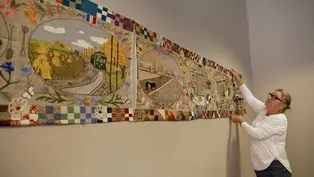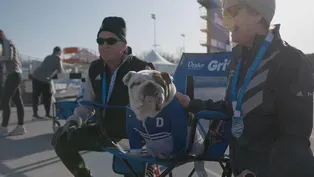
Poetry Palooza
Clip: Season 2 Episode 202 | 6m 39sVideo has Closed Captions
An exuberance of pure poetry takes over Des Moines with workshops by renowned published poets.
An exuberance of pure poetry takes over Des Moines with workshops by renowned published poets, performances and more.

Poetry Palooza
Clip: Season 2 Episode 202 | 6m 39sVideo has Closed Captions
An exuberance of pure poetry takes over Des Moines with workshops by renowned published poets, performances and more.
How to Watch Iowa Life
Iowa Life is available to stream on pbs.org and the free PBS App, available on iPhone, Apple TV, Android TV, Android smartphones, Amazon Fire TV, Amazon Fire Tablet, Roku, Samsung Smart TV, and Vizio.
Providing Support for PBS.org
Learn Moreabout PBS online sponsorshipIt's hard to imagine tomorrow when today it looks like a mountain and you're sitting on the foots and bare feet and being told to climb.
One of the biggest things is people like to think poetry has to be a certain way, but it really does.
And it's very, very free.
We all write poems.
To explain to you that sometimes people hurt people just to hurt people.
The people who sit down and pick up a pen and decide to write a poem are the people who have poems knocking at their door, saying they need to be on a page.
It's difficult to tell between.
Flesh from fabric.
And they're the people who answer the door and go, all right, this is your home now.
Do you know how it feels to snitch on your own father, to break up a bond that you thought would last forever?
But all of us have the poems.
We're all feeling them.
And that's why we feel poetry when we hear it and when.
We read it.
Poetry across Iowa is thriving, and a lot of the work I've gotten to do since moving here is bridging the gap between page poets and spoken word poets.
And when I say page poet, I mean it's written for the page for a book.
And then there's spoken word poets who are performers and spoken word.
It is meant to be heard and listened to and engaged with.
A poem for the end of the world.
Poetry palooza truly is just a celebration of poetry in not just Iowa, but across the country.
We bring in poets who have national recognition.
It's an education experience, too.
We're we're providing workshops for the community, but also we're going into the schools.
We're sending our featured poets into schools, not just here in Des Moines, but across the state.
It's just a really great way to uplift our Iowa and national poets, as well as just amplify the community and show people that we're here.
We have space for you.
We want you to join us.
I can't remember a time that I didn't have poetry as part of my life.
So we are thinking about a place I went to high school and Iowa City.
And like, you can't walk four states without bumping into a writer.
So I was really lucky to be raised in a way where I understood the writers were people, and some of them were super famous and became poet laureate of the United States, and some of them just did this thing, in a way that might be comparable to just playing pickup basketball every other Sunday, you know?
And that lowered the stakes for me.
It was something that I like to do, and I just did it, and I kept doing it.
And I've had some success with it.
Writers thrive on communities, and we read each other our poems and we comment on each other's poems.
We support each other, usually a very kind of private endeavor.
You just don't really make any money ever, as a poet.
And so the real rewards are the beneficial effects of reading poetry and then writing it.
I want you to think about your least dominant of the five major senses.
I think there are a lot of reasons that you might want to come to the session.
One of the key reasons would be to broaden your skills.
Another one is to just practice differently than you might.
We all get stuck in ruts, and it's just useful sometimes to get different points of view.
We get a good mix of, I would say like 30 and 40 year olds, and then we also get a good mix of 50, 60 or 70 year old.
But we also with the education piece, we get so many awesome like high school students involved.
So we are out at Jester Park and we're doing a program for high school students on, on on poetry and mostly texture in creative writing.
So thinking about how how you create language in order to make people feel something and have kind of a mood.
So they're out right now.
Looking around, getting ideas and they're going to be writing an original poem here and in short order.
Now, trees and frogs.
Crickets.
Great kind of scarecrow.
I ate before for dignity to decay, to preschool.
Kids are incredibly, like, spontaneous and imaginative.
It's almost like we have it.
We're born with it.
Then there just comes this kind of unlearning that happens where we get tamped down and told, no, don't you know, don't say that or that's not the right way.
Or and people get more and more self-conscious about language.
Honestly, I think there's a kind of connection, especially when you're in your teen years.
There's a kind of way of expressing yourself that allows you to just like free flow.
They can, like, wield that emotion and show you what they're feeling or they can just do it for themselves and release it, which is good because that's healthy.
I think we're so busy with our lives.
We were so caught up in the city life that it's just busyness and and we're we're kind of like, distracted.
This is a way to kind of find centeredness and to find a place of calm.
And that, I think, leads to better revelations in poetry.
I think there's a common misconception that poetry is complicated.
So I always try to put contemporary poetry in front of people first because it's it's shocking to see, you know, your own experience reflected in a poem.
He couldn't live that way.
And that's why we need poets from all walks of life, because everyone is narrating a kind of different experience.
Events like this, where we get to come together as both poets and then as people who are like, just interested, like, oh, what is this?
And so these events are the moments where you get to meet seasoned poets who who have books out, and they and they do this as a living.
And then you also get to meet someone like, I've never been in front of a mic and I've never shared my poems before.
Right.
You get to have the whole range.
And what it does is it creates this community where I think you want to, like, put your hands in the air a little bit, like, just like stretch.
Those who might be more experience are kind of reaching back and pulling us forward.
And that is essential, especially if we want this art form to to continue to exist and to be seen and heard and appreciated.
After which nothing was ever the same
Video has Closed Captions
Every year, the Centerville town square is overcome with excitement and community spirit. (2m 18s)
Video has Closed Captions
Artists, stitchers and historians in Appanoose County collaborate to tell the story of Centerville. (7m 3s)
Video has Closed Captions
Meet Griff II, Des Moines’s hometown dog. He’s Drake University’s live mascot. (8m 14s)
Providing Support for PBS.org
Learn Moreabout PBS online sponsorship













